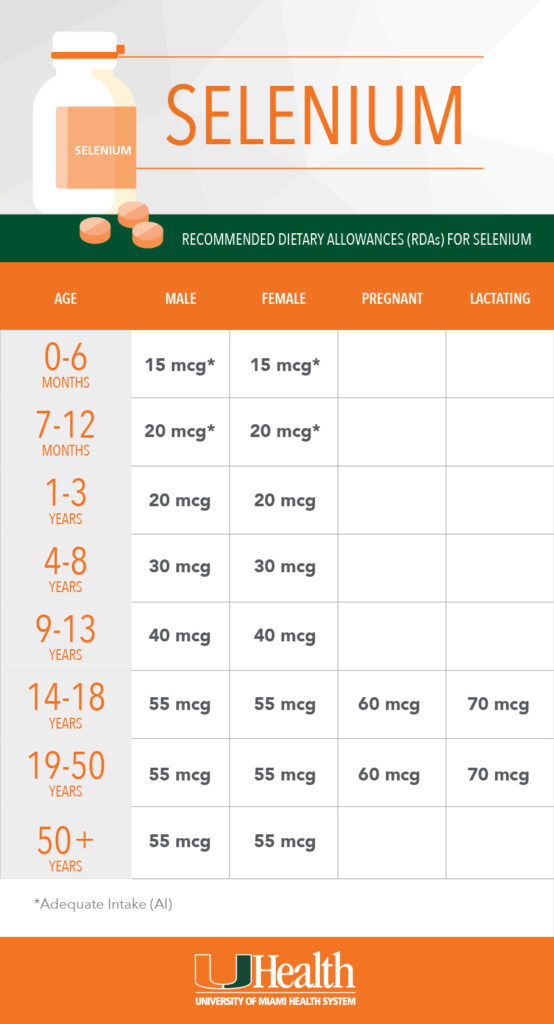Ask the Dietitian: The Straight Facts on Selenium

In the sixth of our seven-part series on minerals, we speak with Sheah Rarback, a registered dietitian nutritionist with the University of Miami Health System, about selenium.
UMiami Health News: How does selenium function in the body?
Sheah Rarback: Selenium is a trace mineral. It acts as an antioxidant to protect the body from damage caused by free radicals. While it’s necessary for health and especially important for thyroid and immune function, we only need very small amounts.
UMHN: Selenium has been credited with preventing cancer, male infertility, cardiovascular disease, cognitive decline, and thyroid disease. What’s your opinion on these claims?
SR: Epidemiological studies suggest it plays a role in all of those conditions, but clinical trials don’t support those claims. The Natural Medicines Database states that taking 200 micrograms of selenium is “possibly effective” for people with thyroiditis (Hashimoto’s disease) who also take thyroid medication. If you have thyroiditis, discuss selenium with your endocrinologist before taking a supplement. Supplement fads, including selenium, come and go. Until there is more than one clinical trial proving effectiveness, don’t jump on the single supplement bandwagon.
UMHN: Selenium content in food depends on how much there is in the soil where plants are grown or animals are raised. You have previously mentioned the problem of mineral depletion in our soils. Do we get enough selenium in our food?
SR: We’re absolutely getting enough with food. In 2010, data from The National Health and Nutrition Examination Survey (NHANES) showed the average daily selenium intake from food in Americans age two and older is 108 micrograms. As you can see from the accompanying chart, that is more than enough. Most multivitamins also contain this mineral. Selenium deficiency is not an issue in the U.S., except for certain people.
UMHN: Who is at risk of selenium deficiency?
SR: Deficiencies are more common in people on dialysis, those with Crohn’s disease, people with HIV and possibly, someone on IV feedings. However, they would also be under a doctor’s care. If a selenium deficiency was suspected, the doctor would order a blood test, versus just telling the patient take supplements.
UMHN: If we need only tiny or trace amounts of this mineral, is there a danger of getting too much selenium?
SR: Yes. Just four times the Recommended Dietary Allowance creates toxicity. Expectant or nursing mothers need to be especially careful. If they eat healthy and take prenatal vitamins, they get sufficient selenium. In 40 years of counseling patients on nutrition, I have never recommended a selenium supplement. People think if they buy something off the shelf, it’s safe. While we need vitamins and minerals to function properly, with certain supplements, there’s a small margin where an ingredient can cause toxicity.
UHMN: Which foods contain the most selenium?
SR: Selenium-rich foods include:
- Seafood, especially yellowfin tuna
- Brazil nuts (1 nut meets the RDA!)
- Organ meats
- Poultry
- Dairy products
- Cereals, breads and other grains
- Dairy products
If you’re concerned about mercury levels in fish, avoid shark, king mackerel, swordfish and tile fish. Tuna is less of a concern than we previously thought. Why? When a fish, like yellowfin tuna, has more selenium in it than mercury, the selenium acts as a protective agent against the mercury.
The Takeaway: Selenium helps thyroid and immune system function, but since tiny amounts are sufficient, a supplement is not recommended. In fact, supplements can create harmful levels of this mineral in the body. Expectant or nursing mothers need to be particularly careful. A few individuals – those on dialysis, with Crohn’s or HIV, are more likely to be deficient, but they should speak with their doctor before supplementing. Many animal proteins and grain products contain selenium; the top sources are Brazil nuts, yellowfin tuna and organ meats. Most multivitamins also contain this mineral.
Q&A compiled by Nancy Moreland, a contributing writer for UMiami Health News.

Chart information from NIH.gov.
